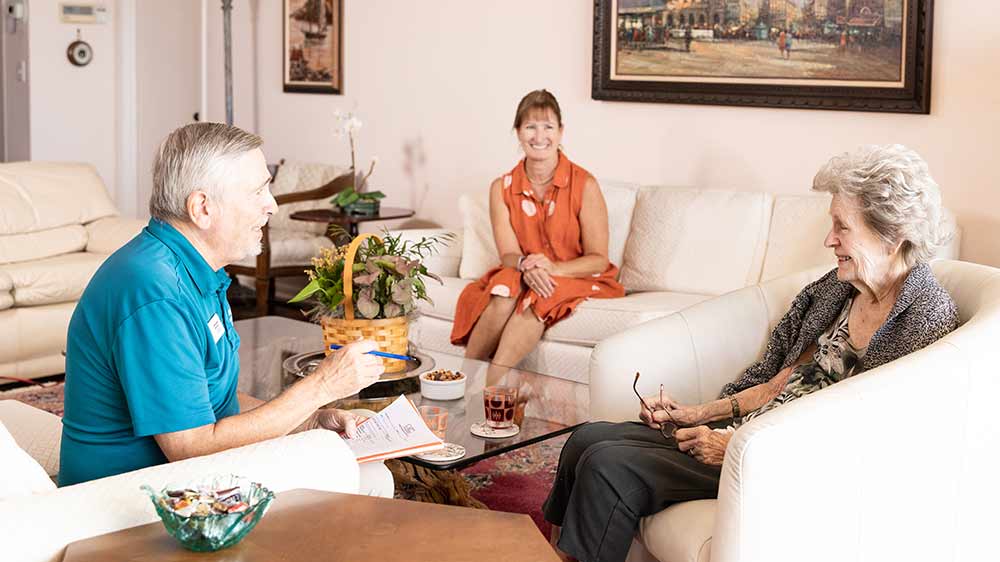

Signs Your Loved One Needs In-Home Care
Are you concerned about the wellness of an elderly parent who’s living alone? If you’ll be visiting them over the holidays, it’s a chance to check on how well they’re doing. If you are already concerned, you’re not alone! Most older adults want to age in place. According to the AARP, 87% of adults age 65 and older want to stay in their current home and community for as long as possible. But how can family members know when it’s time to get help? Here’s what to look out for and where to get help.
Top Signs You May Notice
Many older adults have chronic illnesses and mobility issues that can make it challenging to maintain their physical health and environment. Here are some things to watch for:
- Declining physical health. Signs such as unexplained weight loss, difficulty managing medications, and frequent falls can be red flags that in-home care is needed to ensure your loved one’s health is adequately monitored and managed.
- A neglected home. Unwashed dishes, piles of laundry, an empty fridge, foul odors and a neglected lawn can signal that your loved one is struggling to manage their home.
- Difficulty with personal care. One of the first indicators that in-home care is needed is when your loved one begins to struggle with personal care like bathing, dressing, toileting and grooming. If your once well-groomed loved one is unkempt or has body odor or overall poor hygiene, it may be time to consider in-home care.
- Loneliness and isolation. Loneliness and isolation can make older adults more vulnerable to health problems, such as heart disease, depression and cognitive decline. A loved one who frequently misses family events, is no longer socializing with friends, or is not participating in their usual interests and hobbies may be experiencing loneliness and isolation.
What To Do if You Think Help Is Needed
Concern about your loved one’s safety at home may be overwhelming at times. If you’ve seen potential problems that worry you, you may opt to take the next step, such as:
- Accompanying your loved one to a doctor’s appointment so you hear information firsthand and can get an accurate picture of their condition. You may be able to speak directly with the doctor. Your presence may be comforting for your loved one and beneficial in determining whether they need assistance.
- Asking about medications. Although you may not be a medical expert, it is important to take note of your loved one’s medications. You can obtain information about medications and their adverse effects from a physician or pharmacy. Problems arise when medications expire, are the wrong dose or the wrong prescription. Be proactive and contact the physician or pharmacist if you have questions about your loved one’s medications.
- Documenting information. Keep track of your concerns and what you’ve noted so you will be able to recall everything later. Right at Home offers a RightConversations Guide with an Information Journal to document what is significant and help guide you forward to ensure you are considering everything important and not forgetting key things to consider.
Telling Your Loved One They Need Help
It is a difficult subject to broach. Communication barriers, family dynamics and uncertainty with the health care system can lead to frustration and stress. Gathering other close family members, such as your adult siblings or relatives, can help paint a complete picture and bring everyone together to formulate a plan. But no matter how prepared you may feel you are, telling the person who once cared for you that they may need help is difficult. Right at Home’s RightConversations Guide also provides a Communication Planner to assist you in getting organized and planning the conversation.
How Right at Home Can Help
At Right at Home, our mission is to improve the quality of life for those we serve. Families have trusted us for decades for our expert guidance and experience to help them navigate every step of the aging journey. And we do more than support seniors or others who need regular assistance—we’re here to support and guide their families as well. Our in-home care services include transportation to appointments, help with household tasks, and assistance with bathing, grooming and eating. We also provide memory care and aid for chronic conditions.
Taking the first step to watch for signs a parent or other close loved one needs in-home care is a vital step toward ensuring their safety, well-being and quality of life as they age. Find Right at Home services in your area and speak with an aging expert to get more information.
Need Ongoing Family Caregiving Tips?
Right at Home offers a monthly email newsletter, Caring Right at Home, full of information, advice and helpful ideas as you embark on this aging journey with your loved one. Subscribe today to have it delivered directly to your email inbox.







